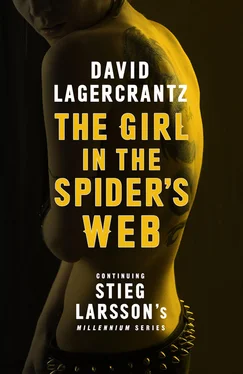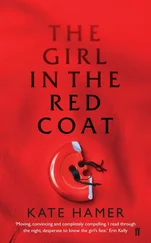For a moment he could barely breathe. He could no longer keep up the pretence. Where the hell had she got that from? He felt dizzy. But then he realized — and that slowed his pulse a little — that she was bluffing. If he believed her even for one second it was only because in his worst moments he too had imagined that Ingram might be guilty of something like that. But Needham knew better than anyone that there was not a shred of evidence of such a thing.
“Don’t try to bullshit me,” he growled. “I have the same material you do and a lot more besides.”
“I wouldn’t be so sure of that, Ed, unless you too have the private keys to Ingram’s R.S.A. algorithm?”
Needham looked at her and told himself that this could not be true. Surely she could not have cracked the encryption? Not even he, with all the resources and experts at his disposal, had thought it was even worth trying.
But now she was suggesting... No, it was impossible. Maybe she had a mole in Ingram’s inner circle? No, that was just as far-fetched.
“This is how it is, Ed,” she said in a new authoritative tone. “You told Blomkvist that you would leave me in peace if I told you how I carried out my data breach. It’s possible you’re telling the truth there. It’s also possible that you’re lying, or that you won’t have any say in the matter anyway. You could get the sack. I don’t see any case at all for trusting you or the people you work for.”
Needham took a deep breath.
“I respect your attitude,” he said. “But I’m a man of my word. Not because I’m a particularly decent person. I’m a vengeful maniac, just like you, young lady. But I wouldn’t have survived as long as I have if I let people down when it matters. You can either believe that or not. I swear to you though, I will make your life hell if you don’t open up.”
“You’re a tough guy,” she said. “But you’re also a proud bugger, aren’t you? You need to make absolutely sure that no-one ever gets wind of my breach, whatever the cost. But as to that, I’m ridiculously well prepared. Every detail of it would be made public before you even have time to blink. I don’t in fact want to do it, but I will humiliate you if I have to.”
“You’re full of shit.”
“I wouldn’t have survived either if I was full of shit,” she said. “I hate this society where we’re watched over all the time. I’ve had enough of Big Brother and authorities in my life. But I’m prepared to do something for you, Ed. If you can keep your trap shut, I can give you information that will put you in a stronger position, and help you clear out the rotten apples in Fort Meade. I’m not telling you anything about my breach — only because it’s a matter of principle for me. But I can help you get your own back on the bastards.”
Ed stared at the strange woman in front of him. Then he did something which would surprise him for a long time.
He burst out laughing. He laughed until he cried.
2. xii–3.xii
Levin woke up in a good mood at Häringe castle after a long conference about the digitalization of the media, which had ended with a big party where the champagne and hard liquor had flowed. A failure of a trade-union representative from the Norwegian newspaper Kveldsbladet had remarked spitefully that Serner’s parties “grow more lavish the more people you sack”, and made a bit of scene which resulted in Levin getting red wine on his tailor-made jacket. But he was happy to let him have that. Especially since it had enabled him to get Natalie Foss up to his hotel room in the small hours. Natalie was twenty-seven and sexy as hell, and despite the fact that he was drunk Levin had managed to have sex with her both last night and this morning.
Now it was already 9.00 and his mobile was pinging and he had more of a hangover than was good for him, bearing in mind all the things he had to do. On the other hand he was a champion in this discipline. “Work hard, play hard” was his motto. And Natalie, Jesus! — how many fifty-year-olds could pull a bird like that? But now he had to get up. He was dizzy as he lurched to the bathroom for a pee. Then he checked his share portfolio. It was usually a good way to start hungover mornings. He picked up his mobile and went into Internet banking.
Something must be wrong, some technical mishap he could not understand. His portfolio had crashed, and as he sat there, shaking and skimming through his assets, he noticed something peculiar. His large holding in Solifon had as good as evaporated. He was beside himself as he went into the stock-exchange sites and saw the same headline everywhere:
THE N.S.A. AND SOLIFON CONTRACTED FOR THE MURDER OF PROFESSOR FRANS BALDER.
MILLENNIUM MAGAZINE REVELATIONS SHOCK THE WORLD.
What he did next is unclear. He probably yelled and swore and banged his fists on the table. He vaguely remembered Natalie waking up, asking what was going on. But the only thing he knew for sure was that he kneeled for a long time over the toilet bowl, vomiting as if there were no end to it.
Grane’s desk at Säpo had been tidied. She would not be coming back. Now she sat there for a little while, leaning back in her chair and reading Millennium . The first page was not what she had expected from a magazine serving up the scoop of the century. It was black, elegant, sombre. There were no pictures. At the top it said:
IN MEMORY OF ANDREI ZANDER
And further down:
THE MURDER OF FRANS BALDER AND THE STORY OF HOW THE RUSSIAN MAFIA GOT TOGETHER WITH THE N.S.A.
AND AMERICA’S LEADING TECHNOLOGY COMPANY
Page two consisted of a close-up of Zander. Even though Grane had never met him, she was moved. Zander looked beautiful and a little vulnerable. His smile was searching, tentative. There was something at once intense and unsure about him. In an accompanying text Erika Berger wrote about how Zander’s parents had been killed by a bomb in Sarajevo. She went on to say that he had loved Millennium magazine, the poet Leonard Cohen and Antonio Tabucchi’s novel Pereira Maintains . He dreamed of the great love and the great scoop. His favourite films were “Dark Eyes” by Nikita Mikhalkov and “Love Actually” by Richard Curtis. Berger praised his report on Stockholm’s homeless as a piece of classic journalism. And even though Zander hated people who offended others, he himself refused to speak ill of anyone. The piece went on:
As I write this, my hands are shaking. Yesterday our friend and colleague Andrei Zander was found dead on a freighter in Hammarbyhamnen. He had been tortured, and had suffered terribly. I will live with that pain for the rest of my life.
But I am also proud to have had the privilege of working with him. I have never met such a dedicated journalist and genuinely good person. Andrei was twenty-six years old. He loved life and he loved journalism. He wanted to expose injustices and help the vulnerable and displaced. He was murdered because he tried to protect a small boy called August Balder and, as we reveal in this issue one of the biggest scandals in modern times, we honour Andrei in every sentence. In his report, Mikael Blomkvist writes:
“Andrei believed in love. He believed in a better world and a more just society. He was the best of us.”
The report ran to more than thirty pages of the magazine and was perhaps the best piece of journalistic prose Grane had ever read. She sometimes had tears in her eyes, but still she smiled when she came to the words:
Читать дальше












